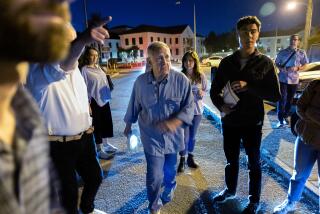Profit Doubts Delay CSUN Retail Center
NORTHRIDGE â Cal State Northridge President Blenda J. Wilson has withdrawn a controversial and long-stalled plan to lease school grounds for retail stores at the request of CSU Chancellor Barry Munitz, who said the proposed University MarketCenter would not make enough money to justify the commercial use of university property.
As Wilson prepared to submit the $16-million MarketCenter development plan to the CSU Board of Trustees for approval this week, Munitz asked her to rework the project and come up with a comprehensive master plan for the schoolâs 65-acre North Campus.
Munitz, who flew out of town Wednesday, was not available to elaborate, said CSU spokeswoman Colleen Bentley-Adler. She said Munitzâs main concern was that the proposed development would not generate enough revenue.
âThereâs a better and more extensive use of the property. It needs to be studied,â Bentley-Adler said.
The change came hours before Wilson was to appear before the 24-member CSU board of trustees Tuesday, seeking final approval to move forward with plans to lease about 11 acres of university property to a private developer for $384,484 a year in rent. Use of the property would have reverted to the campus after 95 years.
âIn my final consultation with Chancellor Munitz, we agreed that despite considerable progress in aligning the needs of the university with the interests of the community, the revised development program only marginally fulfills the principles for the the development,â which the board approved 16 months ago, Wilson told the trustees in Long Beach.
She added, âWe expect to come back to the board at a later date with a more comprehensive master plan that will generate revenue and provide facilities to support the educational mission and strategic priorities of the campus.â
Some CSUN neighbors--who believe the project is too big rather than too small--applauded Wilsonâs withdrawal of the plan.
âItâs excellent news,â said Susan Parmelee, a member of a Northridge neighborhood group fighting the project.
Parmelee and other opponents say there is already a retail glut in Northridge and the project would create more traffic and troubles than it is worth.
She and other project opponents said Munitzâs call for a master plan vindicates their demands of the last 18 months that CSUN incorporate all proposed North Campus developments into a single scheme. Other plans being considered for portions of the North Campus property include a hotel and convention center.
Plans for the commercial development of the schoolâs North Campus began in the 1980s, when former CSUN President James Cleary first raised the idea of a joint public/private development. But the effort has been marked by a number of failures, prompted, in part, by falling real estate prices, changing markets and, more recently, neighborhood opposition.
In a compromise with neighbors, the campus last month reduced its MarketCenter plan from 220,000 to 150,000 square feet. The so-called Contemporary Mediterranean buildings, covered with plaster and stone, were to have housed six major stores, a restaurant and four free-standing shops. The size of the development had been cut from 20 acres to 11.44 acres.
The facility was to be owned by the North Campus-University Park Development Corp., a CSUN nonprofit auxiliary that planned to lease the property to developers Cousins MarketCenters Inc. of Newport Beach.
The compromise to accommodate the neighbors, however, meant the project could generate only half of the original lease income of $800,000 a year.
Kathleen Haff, a local homeowner and an MGM advertising executive, took exception to Wilsonâs statement to the trustees that the project was developed in conjunction with neighbors, faculty and community organizations over the past several months.
Haff, a member of a 28-member task force appointed by Wilson to study the plan, said thatâs not true.
âQuite frankly, I donât know what Blenda Wilson is talking about. The task force had 50 different agendas. None of us agreed on the concept plan,â she said.
The North Campus, farmland formerly known as Devonshire Downs, was given to CSUN by the state in 1967 for educational use.
CSUN officials say revenue from the venture will be spent on instructional materials, faculty research and financial aid for students.
More to Read
Sign up for Essential California
The most important California stories and recommendations in your inbox every morning.
You may occasionally receive promotional content from the Los Angeles Times.










